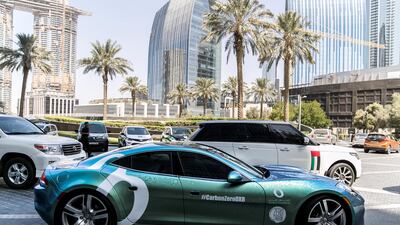Dubai will spend millions of dirhams on incentives to have 42,000 electric vehicles (EVs) on the emirate's streets by 2030.
Dubai Electricity and Water Authority (Dewa) and the Road Transport Authority (RTA) on Sunday announced four incentives to help increase the number of plug-in cars, from free public parking and charging to toll-fee exemption and discounts on the plug-in car's registration.
Saeed Al Tayer, Dewa's managing director and chief executive, said that cost of the project is linked to the rate of utilisation of the incentives. While it was difficult to put an exact figure on how much the government will spend to provide these offers – the free public electricity alone will be in the "millions" of dirhams, he said.
The Dubai government had previously set the tariff for charging EVs by the green chargers at 29 fils per kilowatt hour (kWh), but now until the end of 2019, public charging stations will be free. "This is significant savings compared to fuel-powered cars," Mr Al Tayer said.
__________________
Read more:
UAE hybrid and electric vehicles get special loan rates, but does that make them affordable?
Dubai to double its number of electric vehicle chargers
__________________
Currently there are more than 100 public charging stations throughout the emirate, doubling next year to 200.
Mr Al Tayer said that EV cars such as the Renault Zoe had cost Dh7 to charge, while a similar petrol-fuelled car would cost Dh100 to fill its tank. For Tesla, the price to charge at one of the public stations was Dh29, more than 80 per cent cheaper than the Dh150 for fuel at a petrol station.
In collaboration with Dewa, the RTA has offered free public parking at designated areas which include Madinat Jumeirah, Jumeirah Beach Residence and Dubai International Airport. Nasser Shehab, chief executive of strategy and corporate governance at the RTA, said that there were over 40 parking areas across Dubai designated for EVs, with more being added.
The incentives offered by the RTA do not have an expiration at present. Any EV owner can apply for a Salik fee exemption to bypass the Dh4 charge at each of the seven toll gates as well as a 15 per cent discount on all car registration and renewal fees.
With the addition of these incentives, there are still limitations, said Mr Al Tayer. These include auto finance loans to insurance coverage, but there are also a limited selection of EV cars available for purchase on the UAE market. Tesla started its operations in Dubai in January, offering its Model S sedan, Model X SUV and now the cheaper Model M.
At that time the Tesla founder Elon Musk said that he expected to invest tens of millions of dollars in propelling the UAE'S EV infrastructure. Yet even before Tesla's emergence, France's Renault featured its Zoe in showrooms across the country.
However, there are other types of plug-in cars that may be available in the UAE soon.
BMW makes an all-electric car, known as the i3, yet only its hybrid i8 is in the country. Discussions are under way to have BMW, Honda, Nissan and Toyota all-electric cars sold in the country, a source told The National.
Despite hybrids being sold on the market, not all of the dual-powered types will qualify for this programme as cars must have an electrical plug. For instance, the Toyota Mirai is powered by hydrogen fuel. It is considered a hybrid car, but does not rely on electricity as a form of its power.
"I think there will be more cars in the future with the adaptation, definitely, but first we have this initiative and we need market penetration," said Mr Al Tayer. "Once we have solid infrastructure, I think this will attract more customers and agents [car makers] will increase."
The EV market is expected to make up the majority of new car sales worldwide by 2040, according to Bloomberg New Energy Finance (BNEF). Colin McKerracher, a BNEF transport analyst, said in June that he saw "momentous inflection point for the global auto industry in the second half of the 2020s".
BNEF forecasts EV sales globally will more than triple to 3 million by 2021 from 700,000 last year.
Ivano Iannelli, the Dubai Carbon chief executive, said that the EV model of the future will come from a Silicon Valley-type company.
"Don't expect EV manufacturers to be the BMW or Toyota, but your Apple, Google and other disruptive innovation companies," he said. "These are the companies that no one has heard of or feel threatened by currently, but tomorrow, they'll be the 'Teslas' attacking the market."

